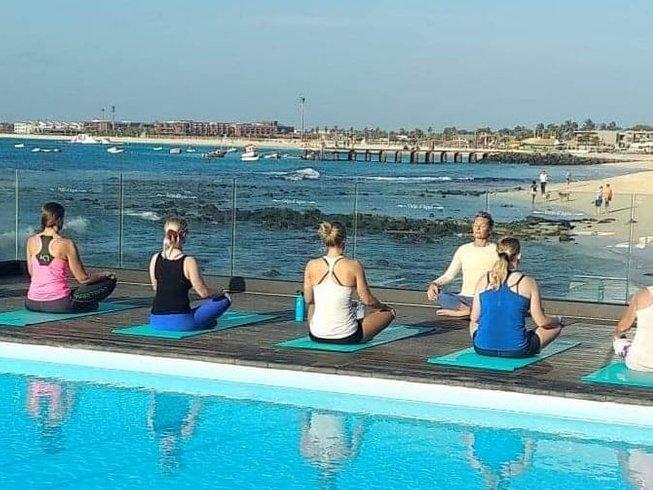Search for yoga retreats
Discover yoga retreats, holidays, and courses from worldwide.
In today's non-stop world, sleep often takes a backseat to our endless to-do lists. It's a common scenario: we push through fatigue, only realizing the true value of rest when our sleep patterns go haywire. This is especially true for yoga enthusiasts and aspiring instructors who are trying to balance their passion with daily life demands.
Why Sleep Matters in Yoga
Quality sleep isn't just a luxury - it's a fundamental pillar of health, just as crucial as a balanced diet and regular exercise. For yogis, sleep takes on even greater significance. It's during these restful hours that our bodies repair and integrate the physical benefits of our practice, while our minds process the philosophical teachings we've absorbed.
Yoga retreats and teacher training programs have long recognized the integral role of sleep in overall well-being. Let's explore how these immersive experiences can revolutionize your relationship with sleep and, by extension, enhance your yoga journey.
The Sleep-Yoga Connection: Insights from Yoga Retreats
- Stress Busting: Yoga retreats offer a respite from daily pressures, allowing your nervous system to recalibrate. This stress reduction often translates to more peaceful nights.
- Nature's Embrace: Many retreats are set in serene, natural environments. This change of scenery can reset your circadian rhythms, leading to improved sleep quality.
- Digital Detox: Retreats often encourage reduced screen time, eliminating a major sleep disruptor.
- Mindful Eating: Retreat meals are typically designed to support both your practice and your sleep, avoiding sleep-disrupting foods and focusing on nourishing, easily digestible options.
- Community Support: Sharing experiences with like-minded individuals can ease anxiety and promote a sense of calm that carries into your sleep.

Yoga Teacher Training: A Deep Dive into Sleep Science
While retreats offer a taste of better sleep, yoga teacher training programs provide a comprehensive education on the sleep-yoga relationship:
- Chronobiology Lessons: Trainees learn about the body's natural rhythms and how to align their yoga practice with these cycles for optimal sleep.
- Pranayama for Sleep: Specific breathing techniques are taught to calm the mind and prepare the body for rest.
- Restorative Yoga: Trainees master gentle, sleep-promoting poses that can be practiced before bedtime.
- Yoga Nidra: This powerful relaxation technique, often covered in training, can improve sleep quality and help manage insomnia.
- Ayurvedic Wisdom: Many programs include Ayurvedic principles for better sleep, including dietary recommendations and daily routine adjustments.
The Science of Sleep: What Yogis Need to Know
Sleep researchers have identified several key factors that constitute quality sleep. Understanding these can help you gauge and improve your own sleep patterns:
- Sleep Onset: Ideally, you should fall asleep within 30 minutes of going to bed.
- Sleep Continuity: Waking up more than once per night may indicate poor sleep quality.
- Sleep Efficiency: Aim to spend at least 85% of your time in bed actually sleeping.
- Rapid Return to Sleep: If you do wake up, you should be able to fall back asleep within 20 minutes.
These benchmarks provide a useful framework, but remember that individual sleep needs can vary. The goal is to wake up feeling refreshed and energized for your yoga practice.
Practical Sleep Tips from Yoga Retreats and Trainings
Whether you're attending a yoga retreat or embarking on teacher training, you'll likely encounter these sleep-enhancing strategies:
- Consistent Schedule: Stick to regular sleep and wake times, even on weekends.
- Bedtime Ritual: Develop a calming pre-sleep routine, such as gentle stretching or meditation.
- Sleep-Friendly Environment: Keep your bedroom cool, dark, and quiet.
- Mindful Consumption: Limit caffeine and heavy meals close to bedtime.
- Evening Yoga: Practice calming poses like forward bends and twists in the evening.
- Gratitude Practice: End your day by reflecting on positive moments, promoting a peaceful mindset for sleep.

Beyond the Mat: Long-Term Benefits of Better Sleep
The sleep improvements gained from yoga retreats and teacher training extend far beyond your time on the mat:
- Enhanced Immune Function: Quality sleep boosts your body's defenses.
- Improved Mental Clarity: Well-rested yogis often report better focus and decision-making abilities.
- Emotional Balance: Good sleep contributes to better mood regulation and stress management.
- Physical Recovery: Proper rest allows for better muscle recovery and growth, supporting your yoga practice.
- Longevity: Consistent, quality sleep is associated with a longer, healthier life.
Integrating Sleep Wisdom into Your Daily Yoga Practice
Whether you've just returned from a transformative yoga retreat or completed an intensive teacher training, the challenge lies in maintaining these sleep-enhancing practices in daily life. Here are some strategies:
- Home Sanctuary: Create a sleep-friendly yoga space at home, mimicking the tranquil environment of a retreat.
- Tech-Free Evenings: Implement a digital sunset, turning off devices at least an hour before bed.
- Sleep Journal: Keep track of your sleep patterns and how they correlate with your yoga practice.
- Community Connection: Stay in touch with fellow retreat-goers or trainees for ongoing support and accountability.
- Continuous Learning: Attend workshops or online sessions to keep refining your sleep-yoga connection.
The Journey to Better Sleep Through Yoga
Remember, improving your sleep is a journey, not a destination. Just as your yoga practice evolves over time, so too will your relationship with sleep. Be patient with yourself and approach your sleep practice with the same mindfulness you bring to your mat.
Whether you're considering a yoga retreat to reset your sleep patterns or diving into a teacher training to deepen your understanding of yoga's impact on rest, you're taking a powerful step towards holistic well-being. By prioritizing sleep and harnessing the wisdom gained through yoga, you're not just investing in better nights - you're enhancing every aspect of your life and yoga journey.
So, the next time you find yourself in savasana, whether in a sun-drenched retreat center or your local studio, remember that each breath, each pose, and each moment of mindfulness is contributing not just to your waking practice, but to the quality of your sleep and overall vitality. Sweet dreams and namaste!
Craving More Stories?
Join our ShopYogaRetreats newsletter for the latest updates on thrilling
destinations and inspirational tales, delivered straight to your inbox!
We value your privacy. Your email address will never be shared or published.
 English
English Deutsch
Deutsch Français
Français Nederlands
Nederlands Español
Español

